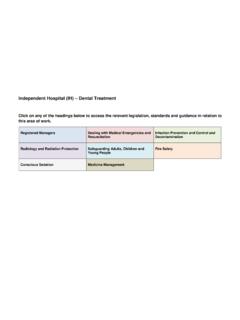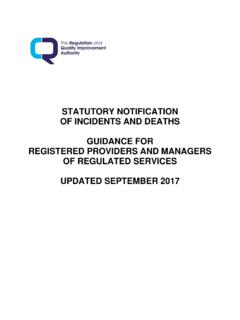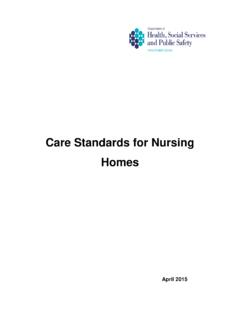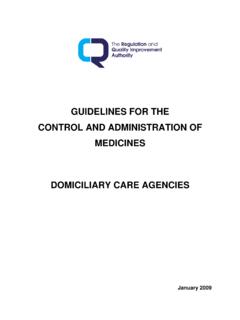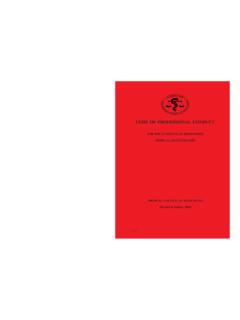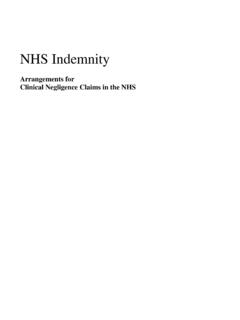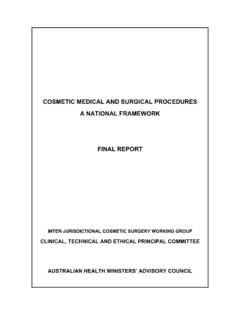Transcription of Minimum Care Standards for Independent Healthcare ...
1 Minimum Care Standards for Independent Healthcare Establishments July 2014. Contents Page Introduction 6. Using the Standards 9. Values Underpinning the Standards 11. Common Standards Standards for Patients and Clients Standard 1: Informed Decision Making 14. Standard 2: Informed Consent 16. Standard 3: Safeguarding 18. Standard 4: Dignity Respect and Rights 20. Standard 5: Patient and Client Partnerships 21. Standard 6: Care Pathway 22. Standard 7: Complaints 24. Standard 8: Records 26. Standard 9: Clinical Governance 27. Standards for Workforce Governance Standard 10: Qualified Practitioners, Staff and Indemnity 30. Standard 11: Practising Privileges 32. Standard 12: Staffing 34. Standard 13: Professional Supervision, Training and 36.
2 Development Standard 14: Recruitment 38. Standard 15: Volunteers 40. Standards for Management of the Establishment Standard 16: Management and Control of Operations 42. Standard 17: Risk Management 45. Standard 18: Dealing with medical Emergencies 47. Standard 19: Policies and Procedures 48. 2. Standards for Infection Prevention and Control and Decontamination Standard 20: Infection Prevention and Control 50. Standard 21: Decontamination 52. Standards for Premises, Engineering Services and Equipment (Including medical Devices). Standard 22: Premises and Grounds 56. Standard 23: medical Devices and Equipment 59. Standard 24: Fire Safety 60. Standards for Medicines Standard 25: Management of Medicines 62. Standard 26: Medicines Storage 65.
3 Standard 27: Controlled Drugs 67. Standard 28: Medicines Records 69. Service Specific Standards Hospitals, Clinics and Hospices Standard 29: medical Cover 72. Standard 30: medical Advisory Committee 73. Standard 31: Resuscitation 75. Standard 32: Surgery 77. Standard 33: Services for Children and Young People 80. Standard 34: Pathology 84. Standard 35: Breaking Bad News 85. Standard 36: Care of the Dying 86. Standards for Hospices Standard 37: Arrangements for the Provision of Specialist 89. Palliative Care Standard 38: Discharge Planning 91. Standard 39: Bereavement Care Services 92. Standard 40: Specialist Palliative Care Team 93. Standard 41: Assessment and Care of Children and Young 94. 3. People in Hospices Standard 42: Qualifications and Training for Staff Caring for 97.
4 Children in Hospices Standard 43: Hospice Environment for Care of Children and 98. Young People Standards for Fertility Services and Assisted Conception Standard 44: Facilities for Assisted Conception Services 101. Standard 45: Information and Decision Making for Patients 102. and Clients Undergoing Fertility Treatment Standard 46: Counselling and Support for Patients and 103. Clients Undergoing Fertility Treatment Standard 47: Management of Patients and Clients Undergoing 104. Fertility Treatment Standards for Lasers and Intense Light Source Standard 48: Laser and Intense Light Sources 106. Standards for Dialysis and Hyperbaric Oxygen Treatment Standard 49: Dialysis 110. Standards for Hyperbaric Oxygen Treatment Standard 50: Hyperbaric Oxygen Treatment 112.
5 Standards for Mental Health Hospitals Standard 51: Staff Training on the Mental Health 117. (Northern Ireland) Order 1986 as amended Standard 52: Admission and Assessment 118. Standard 53 Empowerment 119. Standard 54: Risk Assessment and Management 120. Standard 55: Levels of Observation 121. Standard 56: Safeguarding Children and Adolescents in 122. Adult Mental Health Wards Standard 57: Electro-convulsive Therapy (ECT) 123. 4. Standard 58: Specific Treatments 124. Standard 59: Managing Disturbed Behaviour 125. Standard 60: Patient Restraint and Physical Interventions 127. Standard 61: Unexpected Patient Death 129. Standard 62: Patients and Clients who leave without informing 130. Staff Standard 63: Detained Patients 131.
6 Standard 64: The Rights of Patients under the Mental Health 134. (Northern Ireland) Order 1986 as amended Standard 65: Seclusion of Patients 135. Standard 66: Leave 137. Standard 67: Absent Without Leave under Article 29 139. Section 2 Requirements for Registration Statement of Purpose 141. Fitness of the Registered Person 142. Fitness of the Registered Manager 143. Suitability of the Premises to be Registered 144. Appendix 1 Policies and Procedures 145. 5. Introduction This document sets out Minimum Standards for Independent health care. The Standards specify the arrangements, facilities and procedures that need to be in place and implemented to ensure the delivery of a quality service. Standards are based on the provisions of the HPSS (Quality, Improvement and Regulation) (Northern Ireland) Order, 2003 and the Independent Healthcare Regulations (Northern Ireland) 2005 and the amendments set out in the Regulation and Improvement Authority ( Independent Health Care) (Fees and Frequency of Inspections) (Amendment) Regulations (Northern Ireland) 2011 and apply to those establishments regulated under the provisions of these regulations.
7 Article 38 of the Health and Personal Social Services (Quality Improvement and Regulation) (Northern Ireland) Order 2003 gives powers to the Department of Health, Social Services and Public Safety (DHSSPS) to publish Minimum Standards that the Regulation and Quality Improvement Authority (RQIA) must take into account in the regulation of establishments and agencies. These Minimum Standards for Independent Healthcare Establishments are written under the provisions of Article 38. Compliance with the regulations is mandatory and non-compliance with some specific regulations is considered an offence. The Regulation and Quality Improvement Authority (RQIA) must take into account the extent to which the Minimum Standards have been met in determining whether or not a service maintains registration or has its registration cancelled, or whether to take action for breach of regulations.
8 The regulations and Minimum Standards have been prepared in response to extensive consultation. They are the Minimum Standards below which no provider is expected to operate. Additionally, each establishment is expected to comply with all other relevant legislation, regulations, guidance and best practice. A key responsibility of the 6. Registered Manager is to ensure that the treatments, procedures and services provided are evidence based and in line with current best practice, for example as defined by professional bodies and national standard setting organisations. The Standards apply to Independent hospitals, Independent clinics, and Independent medical agencies. The legal definition of hospital in this case includes hospices, Independent hospitals providing in-patient mental health care and treatment, dentists and certain beauty salons.
9 An Independent hospital is defined as an establishment the main purpose of which is to provide medical or psychiatric treatment for illness or mental disorder or palliative care, or in which listed services are provided; or in which treatment or nursing (or both) is provided for persons liable to be detained under the Mental Health Order 1986. Hospices are included through providing palliative care. The listed services are defined as: (a) medical treatment under anaesthesia or sedation;. (b) dental treatment (thus all dental practices delivering private treatment are subject to regulation by RQIA). (c) obstetric services and in connection with child birth, medical services;. (d) Cosmetic surgery (excepting ear and body piercing; tattooing.)
10 Subcutaneous injection of substances into the skin for cosmetic purposes and removal of hair roots by application of heat, using an electric current);. (e) Use of prescribed techniques or technology, class 3B or class 4. lasers; filtered radiation, aimed at causing thermal, mechanical or chemical damage to hair follicles and skin blemishes; endoscopy; in vitro fertilisation techniques; haemodialysis or peritoneal dialysis and certain hyperbaric therapies [Thus beauty clinics delivering certain laser treatment or hair removal fall to be regulated by RQIA.]. 7. An Independent clinic is an establishment, which is not a hospital, in which services are provided by medical practitioners who don't deliver any HSC services. An Independent medical agency is an undertaking which includes the provision of services by medical practitioners where none of the services are provided for the purposes of an Independent clinic or for delivering HSC services.
